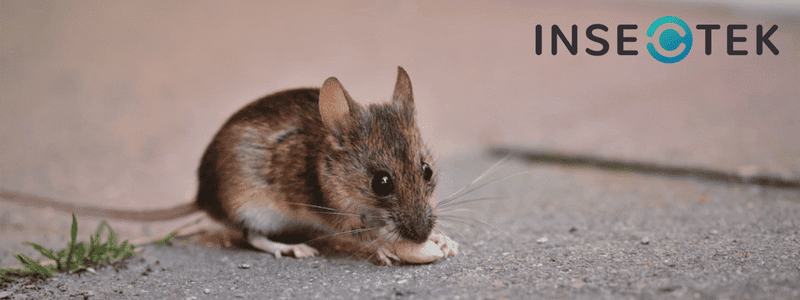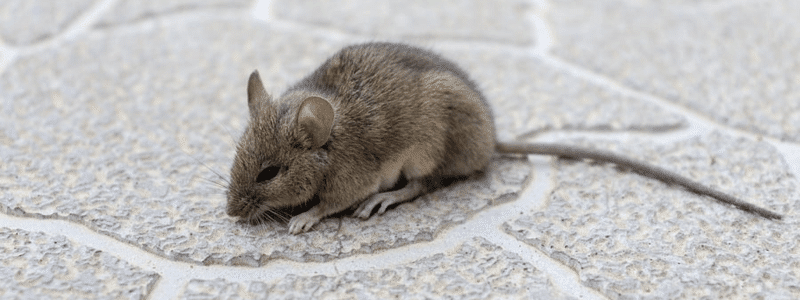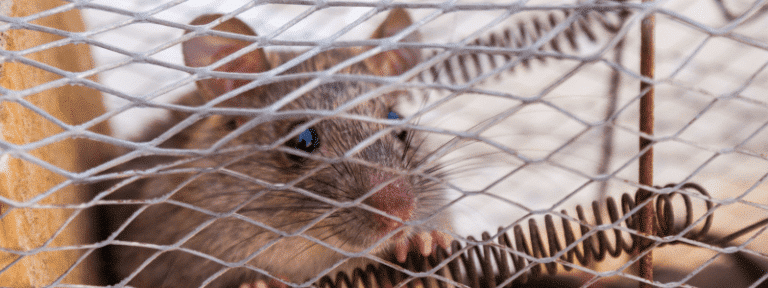Droppings, along with other signs of mice, are a critical indicator you likely have a mice infestation requiring professional pest control services as soon as possible. The best way to spot and prevent infestations from becoming a severe problem, it’s best to stay educated on what to keep an eye out for.
In this blog, we’ll cover:
- What do mouse droppings look like?
- Do mouse droppings point to an infestation?
- What can be mistaken for mouse droppings?
- What to do when you find mouse droppings?
- What to expect from professional pest control services
- Preventing rodent infestations in your home
What Do Mouse Droppings Look Like?
Most mouse droppings are:
- Granular in shape
- Black or very dark in color
- Shiny (fresher droppings)
- Chalky and dry (older droppings)
- Typically, between 1/8 to ¼ of an inch long
One crucial characteristic you are trying to determine is whether you have a mouse infestation or a different rodent. As droppings increase, the likelihood of rat infestation or other rodents increases.
Do Mouse Droppings Point to an Infestation?

If you find mice droppings in your house, you likely have a mouse infestation. Seeing one isolated dropping is a rare occurrence, and usually, you will find mouse droppings in places that indicate they are trying to nest or access your food.
Repeatedly spotting droppings, especially those that range in age, means you probably have mice living in your home, and you should contact pest control services immediately.
What Can Be Mistaken for Mouse Droppings?
Because mouse droppings might look like the waste of other pests, they can easily be confused with:
- Cockroach Droppings
- Rat Droppings
- Squirrel Droppings
- Bat Droppings
All the above droppings will be larger and typically found in places that mice are not necessarily attracted to. However, this is not something we recommend playing detective with – if you see repeated droppings in your home, let a pest control technician figure out the source of the problem.
What to do When You Find Mouse Droppings?
When you find mouse droppings on your property, you don’t need to leave them as forensic evidence – you can clean them up. Similarly, we recommend putting out mousetraps and attempting some DIY damage control, but you still need to contact professional pest control services as soon as possible.
Mouse infestations can be destructive to your property and, more importantly, dangerous to your health. Mice and other rodents can carry disease, and they will infiltrate your food and water supplies if you let an infestation go on for too long.
What to Expect from Professional Pest Control Services

A reputable pest control provider should offer:
- Eco-friendly and property-safe treatments and programs
- A full-property appraisal during the first visit
- A unique treatment plan for your home and property
- Set appointment times – not a range that keeps you waiting all-day
- Itemized treatment plans and detailed costs for all services
- Service warranty or repeated treatments until pests are removed
Your pest control provider should communicate how and how often they will treat your pest infestation. Make sure to find a pest control service that is honest, reputable, and cares about the quality of the job they do.
Preventing Rodent Infestations in Your Home
If you are looking to stay proactive and mouse-free for the long term, try these practices:
Keep a Tidy Home
Mice are attracted to food and water that is left out. Wipe down all your surfaces, take out garbage cans, and clean any messes that might provide a food source for mice.
Seal Any Cracks in Your Home or Foundation
Mice are small, but they still need to be able to get in and out of openings in your house. Any cracks in the foundation, walls, or windows can be an entry point for a rodent infestation.
Set Traps
Live mouse traps are still effective against a few pesky mice. If you use them proactively, they can help to prevent a full-on mouse infestation from happening in your home.
Hire Regular Pest Control
Ultimately, hiring a professional pest control company will save you time, stress, and money in the long run. Over-the-counter products are often expensive and ineffective, and taking your own time to implement them is not an ideal solution.






